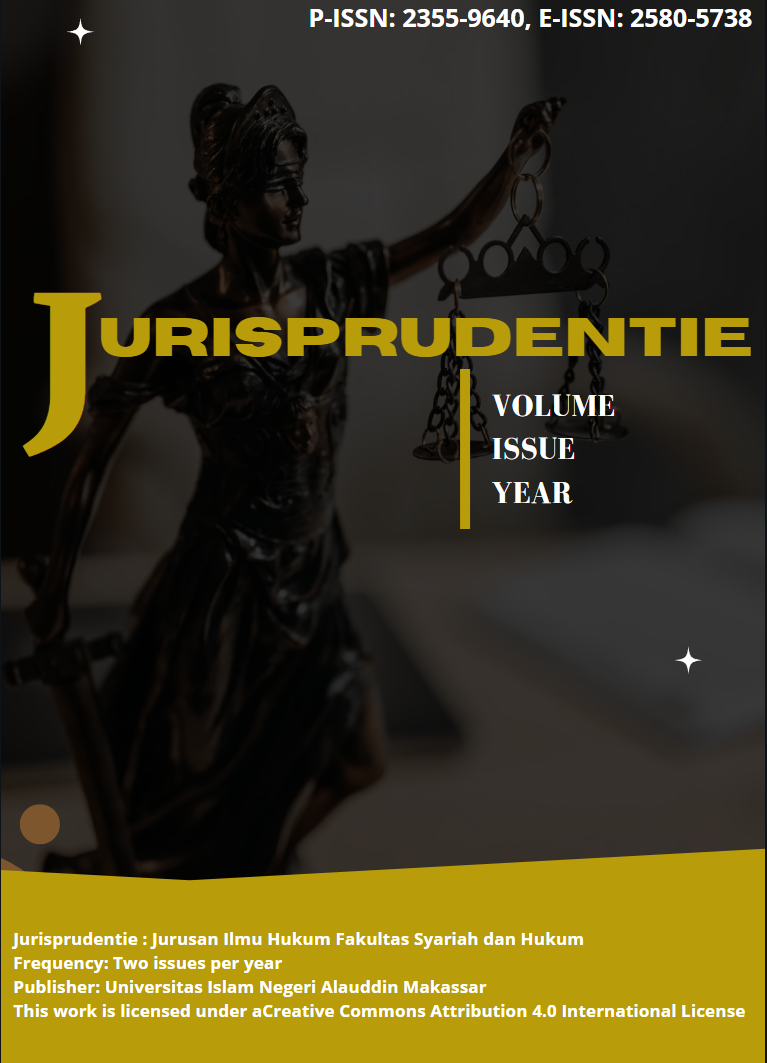JUVENILE SEXUAL OFFENDER: PSCYHOLOGICAL ABUSE BY PARENTS OR CAREGIVER AND ISLAMIC PERSPECTIVES
Abstrak
Psychological abuse has been attributed as the root cause of sexual violence by juvenile, or known as juvenile sexual offender (JSO), while research related to the topic is still little. The purpose of this study is to understand the dynamics of psychological abuse by parents or caregivers so that it is assumed to be a trigger for sexual violence by juvenile, and to see the Islamic views of it. This study used qualitative method with a phenomenological and descriptive approach. The results showed that there were three main themes identified, namely: psychological abuse, appreciation of psychological abuse and the meaning of sexual relations. It can be concluded that participants who feel that they did not get affection from their parents or caregiver as a result of the psychological abuse they experienced are encouraged to seek affection through sexual intercourse. Based on Islamic perspective, psychological abuse by parents or caregivers is a form of violation of the mandate that Allah SWT has entrusted to them.Referensi
Muhammad Ibrahim Al Hamd. Kesalahan dalam Mendidik Anak. Solo: At-Tibyan, 1993.
Al Hasan, Y. M.. Pendidikan Anak dalam Islam. Jakarta: Darul Haq, 2000.
Armiyanti, I., Aini, K., & Apriana, R. “Pengalaman Verbal Abuse oleh Keluarga pada Anak Usia Sekolah di Kota Semarang”. Jurnal Keperawatan Soedirman, vol, no, (March, 2017). https://doi.org/10.20884/1.jks.2017.12.1.714
Bifulco, A., et al.. Exploring Psychological Abuse in Childhood: II. Association with Other Abuse and Adult Clinical Depression. Bulletin of the Menninger Clinic, vol, no, (Summer, 2002)
Cecil, C. A. M., et al.. Disentangling the Mental Health Impact Of Childhood Abuse And Neglect. Child Abuse and Neglect, 63, (November, 2017), pp.106–119. https://doi.org/10.1016/j.chiabu.2016.11.024
Cortoni, F., & Marshall, W. L. “Sex As a Coping Strategy and Its Relationship to Juvenile Sexual History and Intimacy in Sexual Offenders”. Sexual Abuse: A Journal of Research and Treatment, 13(1), (Januari, 2001), pp. 27–43. https://doi.org/10.1177/107906320101300104
Davis, K. A., & Knight, R. A. “The Relation of Childhood Abuse Experiences to Problematic Sexual Behaviors in Male Youths Who Have Sexually Offended.” Archives of Sexual Behavior, vol 48, (January, 2019b) https://doi.org/10.1007/s10508-018-1279-3
Felizzi, M. V. “Family or Caregiver Instability, Parental Attachment, and the Relationship to Juvenile Sex Offending.” Journal of Child Sexual Abuse, 24(6), (September, 2015), pp. 641–658. https://doi.org/10.1080/10538712.2015.1057668
Fuady, Z. A., Ridha, S., & Zaid, A. Pendidikan Masa Pubertas. Ciputat: Wadi Press, 2007.
Glaser, D. “Emotional Abuse and Neglect (Psychological Maltreatment): A Conceptual Framework.” Child Abuse & Neglect, 26(6–7), (June, 2002), pp. 697–714. https://doi.org/10.1016/S0145-2134(02)00342-3
Hagan, M. P., et al. “Eight-Year Comparative Analyses of Adolescent Rapists, Adolescent Child Molesters, Other....” International Journal of Offender Therapy & Comparative Criminology, vol,45 (June, 2001), pp. 314-324
Hibbard, R., et al. . “Psychological Maltreatment.” Pediatrics, 130(2), (2012), pp. 372–378. https://doi.org/10.1542/peds.2012-1552
Hoeve, M., et al. “The Association Between Childhood Maltreatment, Mental Health Problems, and Aggression in Justice-Involved Boys.” Aggressive Behavior, vol,41 no, 5 (March, 2015) https://doi.org/10.1002/ab.21586
Karen Horney. Neurosis and Human Growth. New York: Routledge, 2013.
John W. Santrock. Life-span Development (13th ed.). New York: McGraw-Hill, 2017.
Lawson, D. M. “Family Violence.” Family Violence: Explanations and Evidence-Based Clinical Practice (August, 2015) https://doi.org/10.1002/9781119222750
Muller, R. T., Thornback, K., & Bedi, R. “Attachment as a Mediator between Childhood Maltreatment and Adult Symptomatology.” Journal of Family Violence, 27(3), (February, 2012), pp. 243–255. https://doi.org/10.1007/s10896-012-9417-5
Murray, M. K. “The Male Adolescent’s Perception of Family Dynamics and the Impact on the Development of Sex Offense Behavior: A Qualitative Study.” (May, 2008)
Newbauer, J. F., & Hess, S. W. “Treating Sex Offenders and Survivors Conjointly: Gender Issues with Adolescent Boys.” Journal for Specialists in Group Work, vol, 19 no, 2 (January, 1994) https://doi.org/10.1080/01933929408413772
Nicholas, K. B., & Bieber, S. L. “Parental Abusive Versus Supportive Behaviors and Their Relation to Hostility and Aggression in Young Adults.” Child Abuse and Neglect, vol,20 no,12 (December, 1996) https://doi.org/10.1016/S0145-2134(96)00115-9
Paivio, S. C., & Christine, L. “Empathy and Emotion Regulation: Reprocessing Memories of Childhood Abuse.” Journal of Clinical Psychology, vol, 57 no, 2 (January, 2001). https://doi.org/10.1002/1097-4679(200102)57:2<213::AID-JCLP7>3.0.CO;2-B
Raine, A., et al. “The Reactive-proactive Aggression Questionnaire: Differential Correlates of Reactive and Proactive Aggression in Adolescent Boys.” Aggressive Behavior, vol,32 (Fabruary, 2006). https://doi.org/10.1002/ab.20115
Righthand, S., & Welch, C. Juveniles who Have Sexually Offended - A Review of the Professional Literature. Juvenile Justice (Maret, 2001) https://doi.org/10.1037/e313292005-001
S. Suhaida, J. Hos, A. U. “Pergaulan Bebas di Kalangan Pelajar (Studi Kasus di Desa Masaloka Kecamatan Kepulauan Masaloka Raya Kabupaten Bomabana).” Neo Societal, 3(2), (2018), pp. 425–432. Retrieved from http://ojs.uho.ac.id/index.php/NeoSocietal/article/viewFile/4032/3115
Seto, M. C., & Lalumière, M. L. “What is so Special About Male Adolescent Sexual Offending? A Review and Test of Explanations Through Meta-Analysis.” Psychological Bulletin, 136(4), (February, 2010), pp. 526–575. https://doi.org/10.1037/a0019700
Thibodeau, M. E., et al. “Pathways Linking Childhood Maltreatment and Adolescent Sexual Risk Behaviors: The Role of Attachment Security.” Journal of Sex Research, vol,54 no,8 (May, 2017). https://doi.org/10.1080/00224499.2017.1316816
Ulwan, A. N. Pedoman Pendidikan Anak dalam Islam. Bandung: Asy-Syifa, 1990.
Willig, C. Introducing Qualitative Research in PsychologyWilling. Berkshire: McGraw-Hill House, 2008. https://doi.org/10.2307/2183481
Wind, T. W., & Silvern, L. “Parenting and Family Stress as Mediators of The Long-term Effects of Child Abuse.” Child Abuse and Neglect, vol,18 no 5, (May, 1994). https://doi.org/10.1016/0145-2134(94)90029-9
Yanggo, H. T. Fiqih Anak. Jakarta Selatan: PT. Al-Mawardi Prima, 2004.
Zankman, S., & Bonomo, J. Working with Parents to Reduce Juvenile Sex Offender Recidivism.” Journal of Child Sexual Abuse, 13(3–4), (October, 2004), pp. 139–156. https://doi.org/10.1300/J070v13n03_08
Websites
Komisi Perlindungan Anak Indonesia. (2016, July 16). “Rincian Data ABH Per Bulan - 2015.”https://bankdata.kpai.go.id/tabulasi-data/data-kasus-per-bulan/rincian-data-abh-per-bulan-2015. Accessed August 2020.
Once an article was published in the journal, the author(s) are:
- to retain copyright and grant to the journal right licensed under Creative Commons License Attribution that allows others to share the work with an acknowledgement of the work's authorship.
- permitted to publish their work online in third parties as it can lead wider dissemination of the work, with an acknowledgement of its initial publication in this journal
- continue to be the copyright owner and allow the journal to publish the article with the CC BY license
- receiving a DOI (Digital Object Identifier) of the work.


